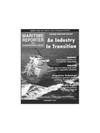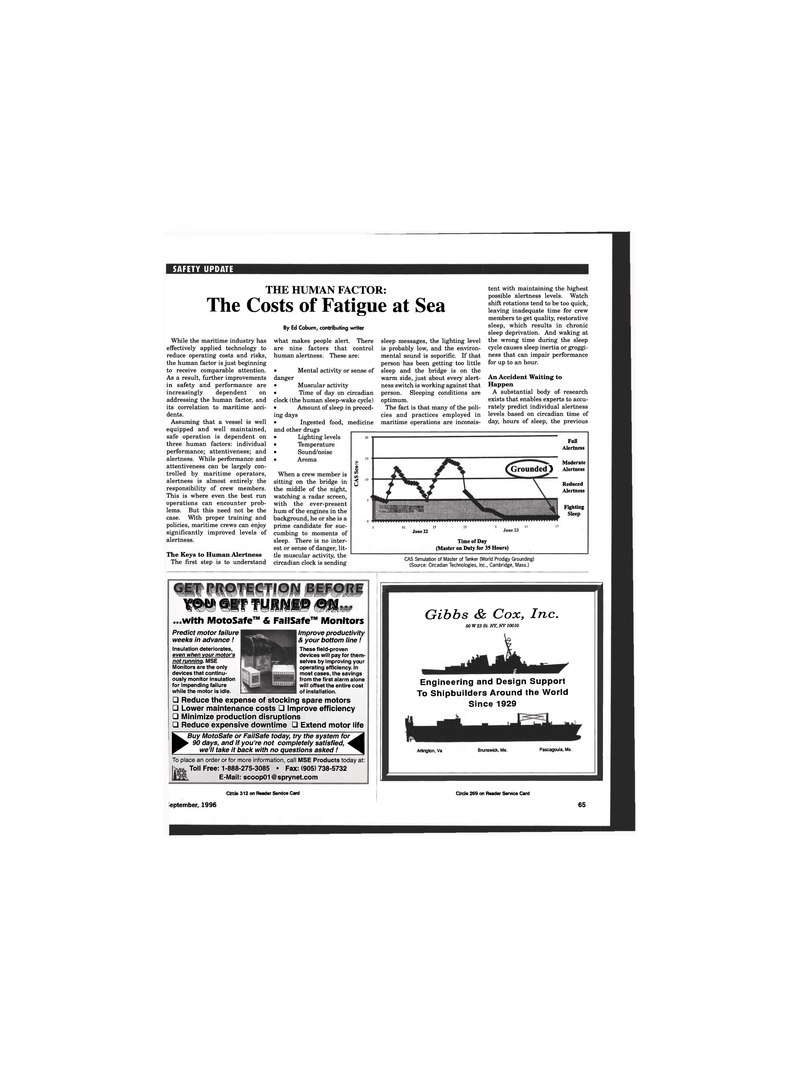
Page 65: of Maritime Reporter Magazine (September 1996)
Read this page in Pdf, Flash or Html5 edition of September 1996 Maritime Reporter Magazine
SAFETY UPDATE
THE HUMAN FACTOR: The Costs of Fatigue at Sea
While the maritime industry has effectively applied technology to reduce operating costs and risks, the human factor is just beginning to receive comparable attention.
As a result, further improvements in safety and performance are increasingly dependent on addressing the human factor, and its correlation to maritime acci- dents.
Assuming that a vessel is well equipped and well maintained, safe operation is dependent on three human factors: individual performance; attentiveness; and alertness. While performance and attentiveness can be largely con- trolled by maritime operators, alertness is almost entirely the responsibility of crew members.
This is where even the best run operations can encounter prob- lems. But this need not be the case. With proper training and policies, maritime crews can enjoy significantly improved levels of alertness.
The Keys to Human Alertness
The first step is to understand
By Ed Coburn, contributing writer what makes people alert. There are nine factors that control human alertness. These are: • Mental activity or sense of danger • Muscular activity • Time of day on circadian clock (the human sleep-wake cycle) • Amount of sleep in preced- ing days • Ingested food, medicine and other drugs • Lighting levels • Temperature • Sound/noise • Aroma sleep messages, the lighting level is probably low, and the environ- mental sound is soporific. If that person has been getting too little sleep and the bridge is on the warm side, just about every alert- ness switch is working against that person. Sleeping conditions are optimum.
The fact is that many of the poli- cies and practices employed in maritime operations are inconsis- tent with maintaining the highest possible alertness levels. Watch shift rotations tend to be too quick, leaving inadequate time for crew members to get quality, restorative sleep, which results in chronic sleep deprivation. And waking at the wrong time during the sleep cycle causes sleep inertia or groggi- ness that can impair performance for up to an hour.
An Accident Waiting to
Happen
A substantial body of research exists that enables experts to accu- rately predict individual alertness levels based on circadian time of day, hours of sleep, the previous
When a crew member is sitting on the bridge in the middle of the night, watching a radar screen, with the ever-present hum of the engines in the background, he or she is a prime candidate for suc- cumbing to moments of sleep. There is no inter- est or sense of danger, lit- tle muscular activity, the circadian clock is sending o u (73 a> <
V
Full
Alertness
Moderate Grounded"} Alertness
SH m sm m m . , • •Si
Reduced
Alertness
Fighting
Sleep 11 17
June 22
Time of Day (Master on Duty for 35 Hours)
CAS Simulation of Master of Tanker (World Prodigy Grounding) (Source: Circadian Technologies, Inc., Cambridge, Mass.) mm «sr wmm m ...with MotoSafe™ & FailSafe™ Monitors
Predict motor failure weeks in advance!
Insulation deteriorates, even when your motor's not running. WISE
Monitors are the only devices that continu- ously monitor insulation for impending failure while the motor is idle.
Improve productivity & your bottom line!
These field-proven devices will pay for them- selves by improving your operating efficiency. In most cases, the savings from the first alarm alone will offset the entire cost of installation. • Reduce the expense of stocking spare motors • Lower maintenance costs • Improve efficiency • Minimize production disruptions • Reduce expensive downtime • Extend motor life •
Buy MotoSafe or FailSafe today, try the system for 90 days, and if you're not completely satisfied, we'll take it back with no questions asked! 1
To place an order or for more information, call MSE Products today at:
Toll Free: 1-888-275-3085 • Fax: (905) 738-5732
E-Mail: [email protected]
Circle 312 on Reader Service Card ieptember, 1996
Gibbs & Cox, Inc. 50 W 23 St. NY, NY 10010
Engineering and Design Support
To Shipbuilders Around the World
Since 1929
Arlington, Va Brunswick, Me. Pascagoula, Ms.
Circle 269 on Reader Service Card 65

 64
64

 66
66
